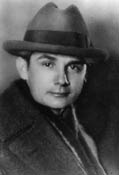 This Goodly Land
This Goodly Land
Clarence Cason (December 20, 1898–May 8, 1935)

Other Names Used
- Clarence E. Cason: full name
- Chico Cason: college/journalist nickname
Alabama Connections
- Ragland, St. Clair County: birthplace
- Talladega, Talladega County: childhood residence
- Tuscaloosa, Tuscaloosa County: education, adult residence, place of death
- Birmingham, Jefferson County: brief adult residence
Selected Works
- Cason, Clarence. 90° in the Shade. Illus. J. Edward Rice. Chapel Hill: University of North Carolina Press, 1935. Rpt. University: University of Alabama Press, 1983. Rpt. Tuscaloosa: University of Alabama Press, 2001.
Biographical Information
Clarence Cason was born in Ragland, Ala., and grew up in Talladega, Ala. He attended the University of Alabama, graduating in 1917. While there, he served as managing editor of the college newspaper and worked for local newspapers during the summer. After graduation, Cason enlisted in the US Army and served as a machine gunner in France during World War I. When he returned from Europe, Cason worked as a journalist for several newspapers, including The Louisville Courier-Journal, The Washington Times, and The New York Times. He also taught at a high school in Louisville, Ky., and briefly attended a theological seminary. Cason earned a master’s degree at the University of Wisconsin, taking classes in journalism and literature. In 1925, he went to the University of Minnesota to teach journalism. While there, he published A Composite Style Book for Journalists.
In 1928, Cason was hired by the University of Alabama to create a department of journalism. He continued to publish essays in national periodicals such as The Literary Digest, The Independent, The Nation, The Christian Science Monitor, and the Baltimore Sun. Cason also served as advisor to the college newspaper, mentoring future journalists such as Gould Beech and Hazel Brannon Smith. In the early 1930s, Cason began collecting essays he had written about the South. Using these as a starting point, he expanded on the ideas in them to produce his book 90° in the Shade. Despite the encouragement of his friends and colleagues, Cason feared that the book's reception would be hostile. In despair, he committed suicide shortly before it was published.
Interests and Themes
Clarence Cason’s 90° in the Shade is a collection of essays about Southern society and culture.
For More Information
Please check your local library for these materials. If items are not available locally, your librarian can help you borrow them through the InterLibrary Loan program. Your librarian can also help you find other information about this author.
There may be more information available through the databases in the Alabama Virtual Library. If you are an Alabama citizen, AVL can be used at your public library or school library media center. You can also get a username and password from your librarian to use AVL at home.
Reference Articles
- Beidler, Philip. "Yankee Interloper and Native Son: Carl Carmer and Clarence Cason: Unlikely Twins of Alabama Exposé". Southern Cultures 9.1. (2003): 18-35.
- Matthews, John M. "Clarence Cason among the Southern Liberals". Alabama Review 38.1. (1985): 3-18.
- Thomson, Bailey. "Clarence Cason's Shade: A Look at Alabama Then and Now". Alabama Heritage 60. (2001): 20-27.
- Thomson, H. Bailey. "Clarence Cason: Journalist in Academe". Alabama Review 52.3. (2000): 177-198.
Reference Book Prefaces
- Flynt, J. Wayne. Introduction. 90° in the Shade by Clarence Cason. University: University of Alabama Press, . v-x.
Photo courtesy of The University of Alabama Press.
Last updated on May 30, 2008.